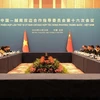With its dubious historic claims, China tried but failed to convince the international community of its sovereignty over Vietnam’s Hoang Sa (Paracel) Islands. Now China is resorting to much more unacceptable and hardball tactics. The article published by VietnamNetBridge will shed light on Vietnam's arguments and China’s quibble.
At a press conference of the Chinese Foreign Ministry spokesman Qin Gang said: "Much of the historical evidence indicates that the Xisha Islands ( Paracel Islands of Vietnam ) has been the inherent territory of China . The Chinese had discovered and named it and at the same time carried out business activities, managed and performed sovereignty here the earliest. Chinese are the owner of the Paracel Islands."
To clarify the fallacious arguments of Chinese, VietnamNetBridge talked with Dr. Tran Cong Truc, former Head of the Government’s Frontier Committee.
Dr. Truc emphasised that the Chinese side is completely wrong. Why? "Yes, the Chinese claim that they have historical evidence to prove that Xisha (Hoang Sa Archipelago of Vietnam) and Nansha ( Vietnam ’s Truong Sa Archipelago) were formed in ancient times, in the BC era. I and many other scholars have heard this many times.”
He continued: “We have also done a lot of analysis and evaluation of this issue. China has relied on a principle called historic sovereignty and historic title over the islands they call Xisha and Nansha. They have exploited all the elements recorded in the historical documents of China to say that the Chinese were present in the East Sea and in these islands; they discovered, explored, did business and then managed and performed their so-called sovereignty over these islands.”
He said: “To be able to clearly determine whether that theory of China justifies it acquisition of territory, we need to consider it based on international principles and international law in resolving disputed territories.
“There are islands in the East Sea , including Hoang Sa (Paracel) and Truong Sa (Spratly) of Vietnam . Let’s me be clear that these islands belong to Vietnam . China occupied Vietnam ’s Hoang Sa Islands by force.
"The argument that China made to justify its claim after using force to occupy Vietnam 's Paracels is based on the so-called theory of historical sovereignty," Dr Truc said.
To assert and defend their claims, both Vietnam and China have relied on the legal principles of true occupation, historic sovereignty, and geographical distance.
"China is using the historic sovereignty theory to prove its sovereignty. This is an extremely outdated theory, which is not used by international law to handle disputes over territorial acquisition of islands," Dr. Truc specified.
According to Dr. Truc, at the present time, to assess in an objective and scientific manner the legal points used by the parties in sovereignty disputes, we need to understand some of the main content of the principles determining the acquisition of national territory in international law.
Dr. Truc stated: “In the long history of the development of international law, the principles and legal norms on the establishment of sovereignty have been formed on the basis of international practice, including methods of acquisition of territory. From the sixteenth century, the development and growth of the countries like the Netherlands , England and France turned them into powerhouses competing with Spain and Portugal , which by a decree of Pope Alexander VI in 1493 divided the affected areas for these two countries in the territory discovered outside Europe .
“In that context, the maritime powers found the legal principles applicable to the acquisition of territory to the territory that they had just discovered. That is the principle of ‘right by discovery’. This principle gives priority of occupation of a territory to the nation that discovered that territory first. However, in practice, the principle of ‘the right by discovery’ has never brought sovereignty to a country that discovered the new territories. Because it is not possible to determine what ‘discovery’ is, the legal value of the discovery, who was the first to discover it, and what is taken to mark that behavior of discovery. Therefore, the concept of discovery was quickly supplemented by the idea of nominal occupation, meaning that the country discovering a new territory must leave traces of its presence there.
“However, the principle of nominal occupation could not fundamentally resolve complicated disputes between the powerhouses for the ‘promised lands’, especially the territories of Africa and islands far from the mainland. This led to more drastic confrontation between the great powers, because they could not specifically agree upon what constituted ‘nominal occupation’.
“Therefore, after the conference on Africa in 1885 of 13 European countries and the United States , and especially after the session of the International Law Institute in Lausanne ( Switzerland ) in 1888, they agreed to apply a new principle. That is the principle of ‘Effective Occupation.’
Article 3, Article 34 and Article 35 of The Treaty of Berlin signed in 1885 determines the content of the principles of Effective Occupation and the essential conditions for the Effective Occupation as follows:
First: There must be notification of an occupation to the nations joining this treaty.
Second: Maintaining the territories in which a power has claimed occupation is sufficient to ensure that the occupation is respected.
According to Dr. Truc, the Declaration of the Lausanne Institute of International Law in 1888 emphasised: "Every occupation that wants to make nominal sovereignty ... must be true, i.e., real, not nominal". This statement made the principle of effective occupation of the Berlin Treaty has the common values in international law, allowing for sovereignty disputes between countries all over the world to be considered and resolved.
The main contents of the effective occupation principle in international law include the following factors:
First: The establishment of territorial sovereignty must be conducted by the state.
Second: The occupation must be conducted peacefully on a derelict territory (Res nullius) or on a territory abandoned by a country that had previously owned it (derelicto).
Third: The use of force to occupy the territory is unlawful. The occupying state must enforce its sovereignty in the necessary levels, at least appropriate with the natural conditions and population of that territory.
Fourth: The exercise of sovereignty must be continuous and peaceful.
Now, although the Saint Germain Convention of 1919 declared the Berlin Treaty void on the basis that the world no longer had derelict territories, lawyers and international tribunals have continued to apply its principles to resolve sovereignty disputes over islands.
For example, the La Haye International Tribunal in April 1928 applied these principles to resolve disputes between America and the Netherlands for Palmas Island. Similarly, the judgment of the International Court of the UN in November 1953 referred to the Berlin Treaty for the sovereignty dispute between Britain and France on the islands of Minquiers and Ecrehous.
More recently, the International Court of Justice decided in favor of Malaysia in its case against Indonesia in December 2002 for sovereignty over Pulau Sipadan and Pulau Ligitan, because the court found that Malaysia had exercised a series of regular activities of the state on these islands.-VNA
At a press conference of the Chinese Foreign Ministry spokesman Qin Gang said: "Much of the historical evidence indicates that the Xisha Islands ( Paracel Islands of Vietnam ) has been the inherent territory of China . The Chinese had discovered and named it and at the same time carried out business activities, managed and performed sovereignty here the earliest. Chinese are the owner of the Paracel Islands."
To clarify the fallacious arguments of Chinese, VietnamNetBridge talked with Dr. Tran Cong Truc, former Head of the Government’s Frontier Committee.
Dr. Truc emphasised that the Chinese side is completely wrong. Why? "Yes, the Chinese claim that they have historical evidence to prove that Xisha (Hoang Sa Archipelago of Vietnam) and Nansha ( Vietnam ’s Truong Sa Archipelago) were formed in ancient times, in the BC era. I and many other scholars have heard this many times.”
He continued: “We have also done a lot of analysis and evaluation of this issue. China has relied on a principle called historic sovereignty and historic title over the islands they call Xisha and Nansha. They have exploited all the elements recorded in the historical documents of China to say that the Chinese were present in the East Sea and in these islands; they discovered, explored, did business and then managed and performed their so-called sovereignty over these islands.”
He said: “To be able to clearly determine whether that theory of China justifies it acquisition of territory, we need to consider it based on international principles and international law in resolving disputed territories.
“There are islands in the East Sea , including Hoang Sa (Paracel) and Truong Sa (Spratly) of Vietnam . Let’s me be clear that these islands belong to Vietnam . China occupied Vietnam ’s Hoang Sa Islands by force.
"The argument that China made to justify its claim after using force to occupy Vietnam 's Paracels is based on the so-called theory of historical sovereignty," Dr Truc said.
To assert and defend their claims, both Vietnam and China have relied on the legal principles of true occupation, historic sovereignty, and geographical distance.
"China is using the historic sovereignty theory to prove its sovereignty. This is an extremely outdated theory, which is not used by international law to handle disputes over territorial acquisition of islands," Dr. Truc specified.
According to Dr. Truc, at the present time, to assess in an objective and scientific manner the legal points used by the parties in sovereignty disputes, we need to understand some of the main content of the principles determining the acquisition of national territory in international law.
Dr. Truc stated: “In the long history of the development of international law, the principles and legal norms on the establishment of sovereignty have been formed on the basis of international practice, including methods of acquisition of territory. From the sixteenth century, the development and growth of the countries like the Netherlands , England and France turned them into powerhouses competing with Spain and Portugal , which by a decree of Pope Alexander VI in 1493 divided the affected areas for these two countries in the territory discovered outside Europe .
“In that context, the maritime powers found the legal principles applicable to the acquisition of territory to the territory that they had just discovered. That is the principle of ‘right by discovery’. This principle gives priority of occupation of a territory to the nation that discovered that territory first. However, in practice, the principle of ‘the right by discovery’ has never brought sovereignty to a country that discovered the new territories. Because it is not possible to determine what ‘discovery’ is, the legal value of the discovery, who was the first to discover it, and what is taken to mark that behavior of discovery. Therefore, the concept of discovery was quickly supplemented by the idea of nominal occupation, meaning that the country discovering a new territory must leave traces of its presence there.
“However, the principle of nominal occupation could not fundamentally resolve complicated disputes between the powerhouses for the ‘promised lands’, especially the territories of Africa and islands far from the mainland. This led to more drastic confrontation between the great powers, because they could not specifically agree upon what constituted ‘nominal occupation’.
“Therefore, after the conference on Africa in 1885 of 13 European countries and the United States , and especially after the session of the International Law Institute in Lausanne ( Switzerland ) in 1888, they agreed to apply a new principle. That is the principle of ‘Effective Occupation.’
Article 3, Article 34 and Article 35 of The Treaty of Berlin signed in 1885 determines the content of the principles of Effective Occupation and the essential conditions for the Effective Occupation as follows:
First: There must be notification of an occupation to the nations joining this treaty.
Second: Maintaining the territories in which a power has claimed occupation is sufficient to ensure that the occupation is respected.
According to Dr. Truc, the Declaration of the Lausanne Institute of International Law in 1888 emphasised: "Every occupation that wants to make nominal sovereignty ... must be true, i.e., real, not nominal". This statement made the principle of effective occupation of the Berlin Treaty has the common values in international law, allowing for sovereignty disputes between countries all over the world to be considered and resolved.
The main contents of the effective occupation principle in international law include the following factors:
First: The establishment of territorial sovereignty must be conducted by the state.
Second: The occupation must be conducted peacefully on a derelict territory (Res nullius) or on a territory abandoned by a country that had previously owned it (derelicto).
Third: The use of force to occupy the territory is unlawful. The occupying state must enforce its sovereignty in the necessary levels, at least appropriate with the natural conditions and population of that territory.
Fourth: The exercise of sovereignty must be continuous and peaceful.
Now, although the Saint Germain Convention of 1919 declared the Berlin Treaty void on the basis that the world no longer had derelict territories, lawyers and international tribunals have continued to apply its principles to resolve sovereignty disputes over islands.
For example, the La Haye International Tribunal in April 1928 applied these principles to resolve disputes between America and the Netherlands for Palmas Island. Similarly, the judgment of the International Court of the UN in November 1953 referred to the Berlin Treaty for the sovereignty dispute between Britain and France on the islands of Minquiers and Ecrehous.
More recently, the International Court of Justice decided in favor of Malaysia in its case against Indonesia in December 2002 for sovereignty over Pulau Sipadan and Pulau Ligitan, because the court found that Malaysia had exercised a series of regular activities of the state on these islands.-VNA



















